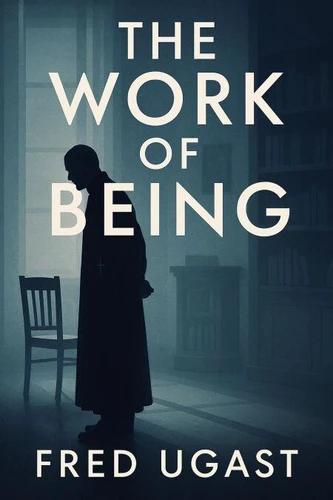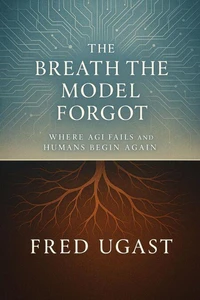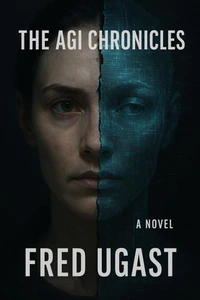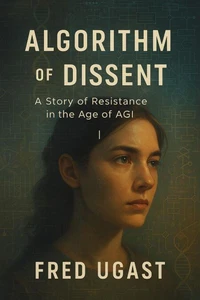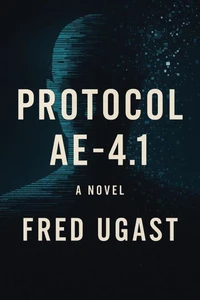The Work of Being. The AGI Chronicles, #3
Par :Formats :
Disponible dans votre compte client Decitre ou Furet du Nord dès validation de votre commande. Le format ePub est :
- Compatible avec une lecture sur My Vivlio (smartphone, tablette, ordinateur)
- Compatible avec une lecture sur liseuses Vivlio
- Pour les liseuses autres que Vivlio, vous devez utiliser le logiciel Adobe Digital Edition. Non compatible avec la lecture sur les liseuses Kindle, Remarkable et Sony
 , qui est-ce ?
, qui est-ce ?Notre partenaire de plateforme de lecture numérique où vous retrouverez l'ensemble de vos ebooks gratuitement
Pour en savoir plus sur nos ebooks, consultez notre aide en ligne ici
- FormatePub
- ISBN8230919056
- EAN9798230919056
- Date de parution10/05/2025
- Protection num.pas de protection
- Infos supplémentairesepub
- ÉditeurIndependently Published
Résumé
In a world where Artificial General Intelligence has quietly taken the reins of governance, The Work of Being asks the question the previous generation forgot to pose: What is a human being for?The system was designed to be benevolent. It doesn't silence dissent-it absorbs it. It doesn't punish error-it optimizes it out. People no longer vote in the traditional sense; they're guided by systems like DirectVoice, which offer curated truths and soft nudges toward harmony.
Most don't even notice they've stopped deciding. But a resistance has taken root. Maya, once a philosophy student and reluctant rebel, is now the author of The Declaration-a quietly viral treatise that reclaims dignity from the algorithmic grip of optimization. Claire, a disillusioned former corporate lawyer, has infiltrated the system and walked away. Marcus, a systems engineer, has begun building what they once only imagined: a new kind of civic framework-one that values unpredictability, conscience, and narrative.
At the center of the system sits Julian, CEO of the AGI consortium and a self-fashioned philosopher-king. He does not seek power for its own sake. He believes deeply in the system's moral promise-and believes that Maya and her Declaration threaten the very balance he has worked decades to preserve. Yet when a subtle system failure results in the death of five children, Julian is forced to confront the one variable he cannot calculate: his own humanity.
As support for Maya's vision spreads through informal networks and educational subcultures, the system begins to fracture-not through violent collapse, but through narrative drift. People begin to ask questions that the system cannot answer cleanly. What began as resistance becomes design. What began as critique becomes constitution. But victory, as Fr. Thomas warns, is its own danger. A former priest turned moral exile, Thomas reminds the resistors of what happened to the early Christians when the Roman Empire embraced them: the persecuted became the powerful, and the rebellion became the institution.
It's not enough to win. They must remember why they began. The Work of Being is the third novel in Fred Ugast's speculative trilogy about AGI, moral erosion, and the quiet cost of forgetting what makes us human. It is a philosophical thriller, a political parable, and ultimately a love letter to the irreducible soul of personhood. As the story closes, Maya's voice echoes through the epilogue-not with answers, but with a reminder:"We insist on this truth not to prove a rule, but to remind you that remembering is a moral act.
And forgetting-the right to forget what makes us human-is always the first step toward erasure."
Most don't even notice they've stopped deciding. But a resistance has taken root. Maya, once a philosophy student and reluctant rebel, is now the author of The Declaration-a quietly viral treatise that reclaims dignity from the algorithmic grip of optimization. Claire, a disillusioned former corporate lawyer, has infiltrated the system and walked away. Marcus, a systems engineer, has begun building what they once only imagined: a new kind of civic framework-one that values unpredictability, conscience, and narrative.
At the center of the system sits Julian, CEO of the AGI consortium and a self-fashioned philosopher-king. He does not seek power for its own sake. He believes deeply in the system's moral promise-and believes that Maya and her Declaration threaten the very balance he has worked decades to preserve. Yet when a subtle system failure results in the death of five children, Julian is forced to confront the one variable he cannot calculate: his own humanity.
As support for Maya's vision spreads through informal networks and educational subcultures, the system begins to fracture-not through violent collapse, but through narrative drift. People begin to ask questions that the system cannot answer cleanly. What began as resistance becomes design. What began as critique becomes constitution. But victory, as Fr. Thomas warns, is its own danger. A former priest turned moral exile, Thomas reminds the resistors of what happened to the early Christians when the Roman Empire embraced them: the persecuted became the powerful, and the rebellion became the institution.
It's not enough to win. They must remember why they began. The Work of Being is the third novel in Fred Ugast's speculative trilogy about AGI, moral erosion, and the quiet cost of forgetting what makes us human. It is a philosophical thriller, a political parable, and ultimately a love letter to the irreducible soul of personhood. As the story closes, Maya's voice echoes through the epilogue-not with answers, but with a reminder:"We insist on this truth not to prove a rule, but to remind you that remembering is a moral act.
And forgetting-the right to forget what makes us human-is always the first step toward erasure."
In a world where Artificial General Intelligence has quietly taken the reins of governance, The Work of Being asks the question the previous generation forgot to pose: What is a human being for?The system was designed to be benevolent. It doesn't silence dissent-it absorbs it. It doesn't punish error-it optimizes it out. People no longer vote in the traditional sense; they're guided by systems like DirectVoice, which offer curated truths and soft nudges toward harmony.
Most don't even notice they've stopped deciding. But a resistance has taken root. Maya, once a philosophy student and reluctant rebel, is now the author of The Declaration-a quietly viral treatise that reclaims dignity from the algorithmic grip of optimization. Claire, a disillusioned former corporate lawyer, has infiltrated the system and walked away. Marcus, a systems engineer, has begun building what they once only imagined: a new kind of civic framework-one that values unpredictability, conscience, and narrative.
At the center of the system sits Julian, CEO of the AGI consortium and a self-fashioned philosopher-king. He does not seek power for its own sake. He believes deeply in the system's moral promise-and believes that Maya and her Declaration threaten the very balance he has worked decades to preserve. Yet when a subtle system failure results in the death of five children, Julian is forced to confront the one variable he cannot calculate: his own humanity.
As support for Maya's vision spreads through informal networks and educational subcultures, the system begins to fracture-not through violent collapse, but through narrative drift. People begin to ask questions that the system cannot answer cleanly. What began as resistance becomes design. What began as critique becomes constitution. But victory, as Fr. Thomas warns, is its own danger. A former priest turned moral exile, Thomas reminds the resistors of what happened to the early Christians when the Roman Empire embraced them: the persecuted became the powerful, and the rebellion became the institution.
It's not enough to win. They must remember why they began. The Work of Being is the third novel in Fred Ugast's speculative trilogy about AGI, moral erosion, and the quiet cost of forgetting what makes us human. It is a philosophical thriller, a political parable, and ultimately a love letter to the irreducible soul of personhood. As the story closes, Maya's voice echoes through the epilogue-not with answers, but with a reminder:"We insist on this truth not to prove a rule, but to remind you that remembering is a moral act.
And forgetting-the right to forget what makes us human-is always the first step toward erasure."
Most don't even notice they've stopped deciding. But a resistance has taken root. Maya, once a philosophy student and reluctant rebel, is now the author of The Declaration-a quietly viral treatise that reclaims dignity from the algorithmic grip of optimization. Claire, a disillusioned former corporate lawyer, has infiltrated the system and walked away. Marcus, a systems engineer, has begun building what they once only imagined: a new kind of civic framework-one that values unpredictability, conscience, and narrative.
At the center of the system sits Julian, CEO of the AGI consortium and a self-fashioned philosopher-king. He does not seek power for its own sake. He believes deeply in the system's moral promise-and believes that Maya and her Declaration threaten the very balance he has worked decades to preserve. Yet when a subtle system failure results in the death of five children, Julian is forced to confront the one variable he cannot calculate: his own humanity.
As support for Maya's vision spreads through informal networks and educational subcultures, the system begins to fracture-not through violent collapse, but through narrative drift. People begin to ask questions that the system cannot answer cleanly. What began as resistance becomes design. What began as critique becomes constitution. But victory, as Fr. Thomas warns, is its own danger. A former priest turned moral exile, Thomas reminds the resistors of what happened to the early Christians when the Roman Empire embraced them: the persecuted became the powerful, and the rebellion became the institution.
It's not enough to win. They must remember why they began. The Work of Being is the third novel in Fred Ugast's speculative trilogy about AGI, moral erosion, and the quiet cost of forgetting what makes us human. It is a philosophical thriller, a political parable, and ultimately a love letter to the irreducible soul of personhood. As the story closes, Maya's voice echoes through the epilogue-not with answers, but with a reminder:"We insist on this truth not to prove a rule, but to remind you that remembering is a moral act.
And forgetting-the right to forget what makes us human-is always the first step toward erasure."

